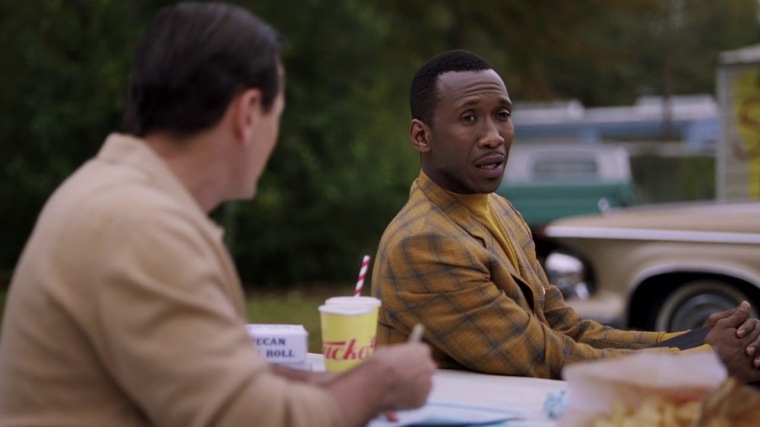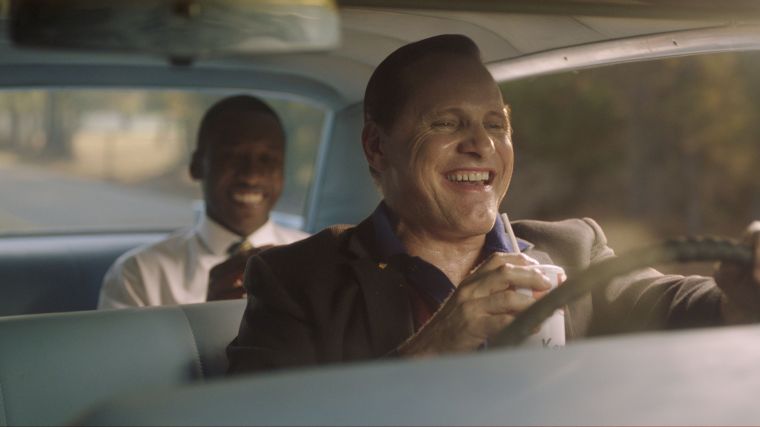Directed By: Peter Farrelly
Written By: Peter Farrelly, Brian Hayes Currie & Nick Vallelonga
Starring: Viggo Mortensen, Mahershala Ali, Linda Cadellini

From Jeff Daniels violently evacuating his bowels into a broken toilet, to Ben Stiller swinging a vicious Border Terrier from his genitals, the stylings of accomplished slapstick/toilet humour extraordinaire Peter Farrelly (along with constant collaborator and brother Bobby) could hardly be described as subtle. Perhaps it comes as little surprise then that the director’s first foray into drama follows that same explicit suit. Green Book is the film, and whilst brother Bobby and the lynchpin gross-out gags are on the sidelines, it’s a Farrelly picture through and through. The heart is large, the strokes are broad, the action bold, and by the roll of the credits you’ll be nothing if not satisfied.
The story is organised by a road trip too, another Farrelly cornerstone. The road bound duo this time are Italian-American bouncer Tony Vallelonga (Tony “Lip” to his friends, derived from his profound powers of bullshitting – played by Viggo Mortensen) and African American concert pianist Doctor Don Shirley (Mahershala Ali,) a real life odd couple who journeyed through America’s deep South as part of a record tour in the winter of 1962. Don Shirley was the star passenger— a blanket on his lap, a book in his hands, and the curses of virtuosity and intelligence written in his face. The jagged edged Tony was the driver– a sandwich in his hand, a rant in his throat, and a belch perpetually swelling in his stomach.
You might well predict the beats of characterisation with little strain. Tony is a typical New York tough guy. He’s simple but street savvy, a gluttonous knucklehead who is quick to uncock his fists but who harbours an apparent heart of gold waiting to be dredged to the surface. Early on we see Tony toss a pair of drinking glasses into the trash that two black men have sipped from. It’s a repugnant act for sure, but only at a glance do we believe Tony to be genuinely hateful. It’s more naivety than ignorance, and Tony’s is a mindset he can easily be coached out of.
Doctor Don Shirley will provide that coaching, a worldly and cultivated intellectual who bears an air of mythic regality. Shirley is a multi-faceted genius, a holder of two doctorates who resides in a throne atop of Carnegie Hall, his abode populated with esoteric artefacts and his rigid demeanour hinting at a thinly veiled melancholia. It’s Shirley who offers Tony temporary employment as a chauffeur and bodyguard, the latter of which an unfortunate necessity for Shirley given the time and place of his genius. With his employment at the Copacabana halted for renovations, Tony bites his lip and takes the job. What results is a highbrow African American with much to teach and more to learn than he realises, paired with a gruff, middle class Italian American with much to learn and more to teach than he knows. It’s Driving Don Shirley, and what it lacks in depth it makes up in crowd-pleasing thrills.
The film takes its title from a mid 20th century guide book that outlines hospitable establishments for negro motorists, another grim necessity in a period where hatred was inextricably woven into the grain of life. The film’s depiction of segregation as an unquestioned fact of existence is incisive. Shirley is banned from the toilets and refused a table at the very venues he performs at, by the very people who invited him to do so. These people are amiable, kind, maybe even fond of Shirley, but the notion of laxing their procedures of segregation for him is unfathomable. It’s a disorienting double standard that serves as Green Book’s most pointed, and sole socio-political insight.

If one is looking for a probing inspection of 1960s racial politics in America, Green Book won’t do. At its core the film is better understood not as a racial drama at all, but as buddy film in which racism serves more as a catalyst for evolution in its characters than as a terrain to be explored in its own right. It’s a safe if slightly problematic tact, with Farrelly’s screenplay (co-authored by Brian Hayes Currie and Tony Vallelonga’s son Nick) seeming to make jarringly uncomplicated work of an imminently complicated world, dutifully addressing the tribulations which befell Shirley before diverting to another light-hearted epiphanic episode.
It’s a tact which could have crippled the film, were it not for the abundance of heart and goodwill that teems from those episodes. Whether trivial or sprawling in their ostensible significance, it’s the exchanges of Tony and Don which provide the launching point for the film’s pathos. Tony alerts Don to the wrongly assumed quintessential “black” joys of Sam Cooke and fried chicken; Don helps Tony graft romantic letters for his loving wife Dolores (Linda Cardellini). Don gains a missing earthiness, Tony gains perspective, and before long we are treated to the obligatory “awards please!” outburst monologue (think Mark Ruffalo in Spotlight or Taraji P. Henson in Hidden Figures) in the form of a teary Ali coming to blows with his own identity. It’s all very Hollywood in its simplicity and calibrated breadth of appeal. Farrelly’s world is never as coarse as one might rightly expect. His direction is deft and professional, playful and polished, gliding along with great handsomeness and little fuss, just like the teal Cadillac which houses the maturation of the two central characters.
At its most glaring, Farrelly’s simplistic style is lingeringly facile. And yet, there is real humanity to it. The impact of Green Book does inevitably fall on Mortensen and Ali, its success predicated on theirs, and that overarching humanity allows the two to capture some of the most unpredictably electric chemistry in recent cinema.

Tony might have been little more than an animated cliché in lesser hands—protruding belly; syrup-thick accent; fists prepared to not only do the talking, but the thinking too. Yet the mercurial Mortensen (he has an uncanny ability to disappear into his characters) effortlessly weaves his way to the heart of Tony, finding ways to summarise the essence of the man in the smallest of gestures – the folding of a family pizza in half for lone consumption, the annoyed shrug he gives when he’s been caught in the wrong. Mortensen burrows in and unearths not only a certain soulfulness in Tony, but flickers of a crusty nobility and wisdom too.
Don Shirley is the more complex of the two central characters. He conducts himself like a man perpetually at work, finding visible reprieve from his rigour only in the written word and the performed note. Ali (already an Oscar winner for Moonlight but who will likely need to clear more space in his cabinet following his work here) communicates waves of tempered sorrow, his severity at once suggesting great dignity and untold longings. It’s nuanced and enthralling, a performance which not only earns its unrestrained moments, but which employs them to startling effect.
Put these performances together and one uncovers a riveting, off-kilter evocation of a father and son: the strict Shirley imparting wisdom on Tony at every turn; Tony forever enticing Shirley to enjoy the lesser things life. They clash, misjudge, and anger, but an undercurrent of affection swells between Tony and Don, and when the two share in a smile it’s all but impossible not to join them. Farrelly may have successfully transplanted his sensibilities into a new genre, but it’s Mortensen and Ali who elevate Green Book from mere entertainment to affecting drama.
Rating:
3.25/4

